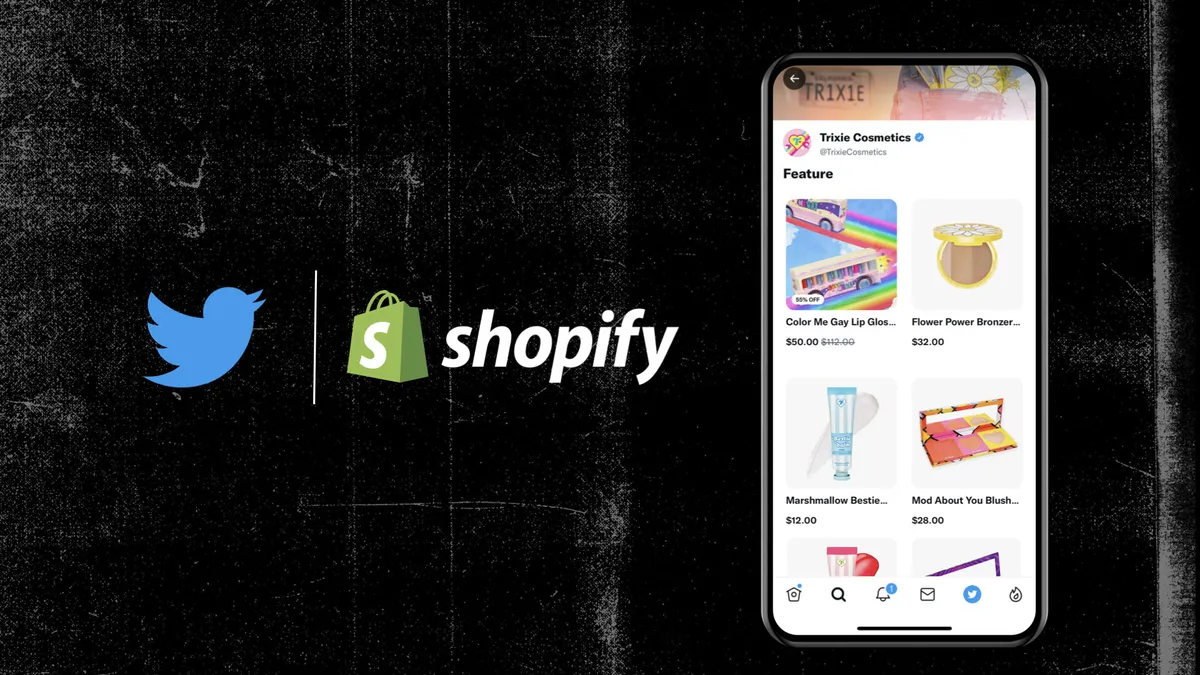Dive Brief:
- Twitter and Shopify this week announced a collaboration to help merchants drive shoppers to their websites to complete a purchase, per a press release.
- Online retailers that use Shopify’s e-commerce software will be able to show as many as 50 items for sale in automatically updated listings on their Twitter profile. Shopify’s App Store now lists a Twitter sales channel app, which is also available through Shopify’s administrator page. Merchants can connect their Twitter accounts to use the social media platform’s Shopping Manager, which features a suite of software tools for e-commerce.
- The integration between Twitter and Shopify lets merchants showcase products on their Twitter profile in the Shop Spotlight or on Twitter Shops, which are now both available to all merchants in the U.S. Twitter’s sales channel app automatically synchronizes with the catalogs of Shopify merchants, eliminating the need for manual updates to product information.
Dive Insight:
Twitter’s partnership with Shopify, whose customer base last year grew from 1.7 million to more than 2 million merchants, gives marketers another tool to support their e-commerce efforts. Those marketers include online merchants, newer digitally native brands or more traditional brands that are expanding beyond brick-and-mortar retail channels and into direct-to-consumer sales. Twitter’s user base grew 12% last year to 214.7 million, including 37.5 million users in the U.S., offering marketers a sizable group of potential shoppers.
The integration comes as more consumers discover products and buy them through social media. Social commerce sales in the U.S. will more than double from $36.6 billion last year to $79.6 billion by 2025, according to an estimate from Insider Intelligence. The researcher said that 44% of U.S. social media users had made a purchase through a social channel, and the percentages are higher among millennial and Gen Z consumers.
Twitter is somewhat of a latecomer to social commerce compared with rivals such as Facebook, Instagram, Pinterest, Snapchat and TikTok, which have expanded their shopping features in the past few years. Online marketplaces such as Amazon and retailers such as Walmart are increasing their online advertising sales, threatening the revenue growth for social media companies. E-commerce support is one way social networks can offer marketers additional services while giving consumers another reason to check in more frequently. E-commerce offers the potential for social media companies to earn commissions on sales and to charge fees on transactions, though platforms such as Facebook have temporarily waived some of these charges as they seek to expand their variety of merchants.
As much as social media companies now compete with retailers for digital advertising dollars, they also are finding ways to collaborate in their e-commerce efforts. Walmart last year hosted the first shoppable livestream on Twitter as the discount chain sought to drive sales during the holiday season. The half-hour variety show featured singer Jason Derulo at his home in Los Angeles. In addition to posting the video its website, Walmart also distributed the content on YouTube, Facebook, Instagram and TikTok to expand its potential reach.














